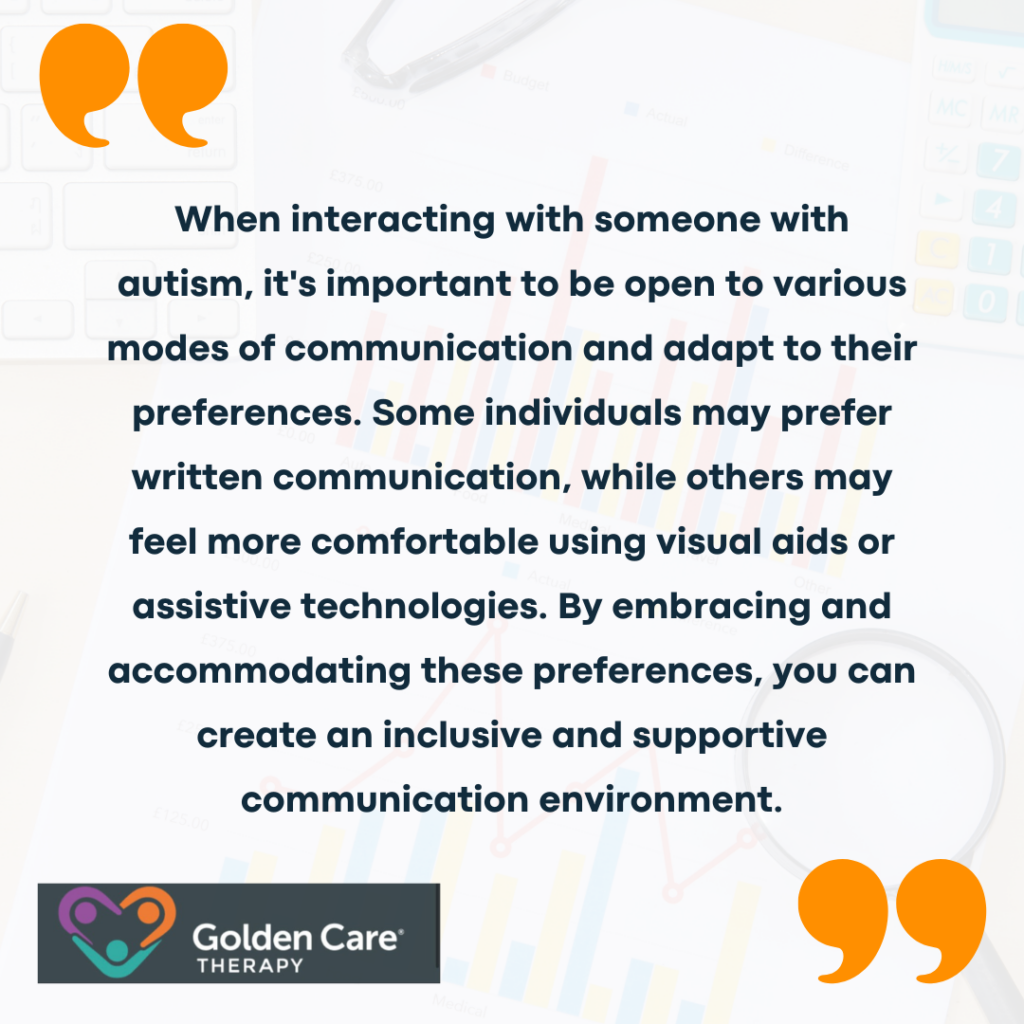Being a good friend to someone with autism means understanding and embracing their unique way of seeing the world. It’s about showing kindness, patience, and respect for their differences.
Friendships can be one of the most rewarding connections in life, and by being thoughtful and supportive, you can help make your friendship with someone with autism stronger and more meaningful. Whether it’s learning how they like to communicate, or just being there when they need a listening ear, there are many simple ways to be a great friend.
Creating a Supportive Environment
In order to foster strong relationships with individuals with autism, it’s important to create a supportive environment that caters to their unique needs and preferences.
Autistic individuals may have a preference for socializing in familiar spaces where they feel comfortable and know what to expect. This allows them to focus on enjoying their time together without feeling overwhelmed by unfamiliar surroundings. This preference is closely related to the sensory processing differences often experienced by individuals with autism.
Choosing familiar settings will help you create a more relaxed and inclusive environment. This could be a quiet park, a familiar cafe, or even their own home. Having a predictable and familiar environment can help reduce anxiety and facilitate better social interactions.
Also, keep in mind that communication is a vital aspect of any relationship, and it’s essential to understand and respect the preferred modes of communication for individuals with autism. Autistic individuals often find it easier to connect through text messaging, social media, online gaming, or in small-group settings rather than face-to-face interactions.
Text-based communication can feel like a ‘level playing field’ for social interaction, providing a more comfortable and accessible means of communication.

It’s worth noting that individual preferences may vary, and it’s important to have open and ongoing conversations about communication methods that work best for both parties. By understanding and respecting the preferred modes of communication, you can foster stronger and more meaningful connections with individuals with autism.
Building Meaningful Connections
When it comes to fostering strong relationships with individuals with autism, building meaningful connections is key. Understanding the importance of autistic friendships and setting appropriate boundaries are crucial aspects to consider in this process.
Importance of Autistic Friendships
Autistic people often find comfort and ease when interacting with others who are also on the autism spectrum. These connections provide a sense of belonging and understanding that may not be as readily available in interactions with non-autistic individuals.
Autistic friendships can offer a unique level of support and empathy, as both parties navigate the world with similar experiences and challenges.
It’s important to recognize that disclosing an autism diagnosis is a personal decision for each individual. Some autistic individuals may choose to disclose their diagnosis in order to gain understanding from their non-autistic peers, feel safe, or simply be themselves around others.
This act of disclosure can be seen as a significant moment, similar to coming out as LGBTQ, highlighting the importance of trust, acceptance, and understanding in building and maintaining relationships with autistic individuals.
Setting Boundaries
Setting boundaries is an important aspect of any relationship, and this holds true when building connections with autistic individuals as well. Autistic individuals may have unique boundaries and sensitivities that should be respected and understood.
It’s crucial to guide autistic individuals in setting boundaries, especially considering their increased vulnerability to bullying and interpersonal abuse. Rather than solely focusing on social skills training for making friends, it’s important to empower autistic individuals to recognize and establish boundaries with individuals who may not respect their needs or safety.
Furthermore, it is essential to acknowledge and respect an individual’s autism label or identity. Dismissing or denying someone’s autism can be perceived as rude and invalidating their existence. Autism plays a significant role in shaping the personalities and behaviors of autistic individuals, and recognizing this is key to fostering meaningful connections.

Navigating Challenges
When fostering strong relationships with autistic individuals, it’s important to be aware of and navigate the unique challenges they may face.
Autistic individuals often have sensory processing differences that can impact their social interactions. They may prefer socializing in familiar spaces where they know what to expect, as this helps them focus on enjoying time together. This preference is related to their sensory sensitivities.
Individuals with autism may be sensitive to loud noises, sights, touch, taste, and smells. Noises that may be easily ignored by others can be overwhelming for them. Bright lights or certain textures can also be uncomfortable. Understanding and respecting these sensory differences is crucial in being a good friend to someone with autism.
To create a supportive environment, it’s important to be mindful of the sensory experiences in social settings. Consider choosing quieter environments or finding ways to reduce excessive noise. Be aware of any potential triggers and try to accommodate their sensory needs when possible.
By respecting their sensory differences, you can help create a more comfortable and enjoyable experience for them.
Autistic individuals may also face challenges when it comes to social interactions. They may find it difficult to navigate social situations, process auditory information in noisy environments, recognize faces, and engage in conversations. These difficulties can impact their ability to connect with others.
When communicating with someone with autism, it’s important to understand their unique communication style. Autistic communication tends to be open, direct, and honest. Small talk may not come naturally to them, and they may prefer to get straight to the point in conversations. Embrace their communication style and be patient in understanding their perspective.
Autistic individuals may have various support needs, such as help with transitioning between activities, navigating social situations, and tending to biological needs. It’s important to address these support needs directly and provide assistance when needed.
How to Support Autistic Individuals
In order to foster strong relationships with autistic individuals, you have to recognize their unique support needs and respect their differences. By doing so, you can create a supportive and inclusive environment that nurtures meaningful connections.
Autistic individuals may have various support needs, ranging from assistance with transitioning between activities to navigating social situations. It’s crucial to understand and address these support needs directly to enhance relationships with autistic individuals. By providing the necessary support, you can help them feel more comfortable and confident in social interactions.
Also, respecting the differences of autistic individuals is fundamental to being a good friend and creating a supportive environment. Autistic communication tends to be open, direct, and honest. They may prefer skipping small talk and getting straight to the point in conversations. Being aware of this communication style can foster more meaningful and effective interactions.
In addition to communication differences, it is crucial to respect sensory differences in individuals with autism. Autistic individuals are often sensitive to sounds, sights, touch, taste, and smells.
Understanding and respecting these differences, even if not fully understood, is essential in being a good friend to someone with autism. Creating a sensory-friendly environment can help promote their comfort and well-being.
Embracing Genuine Connections
When building a friendship with someone with autism, it’s important to embrace genuine connections based on mutual interests and values. Autistic individuals often have unique social preferences and communication styles, and fostering a meaningful friendship requires understanding and respect.

Mutual Interests and Values
One of the keys to building a strong friendship with someone with autism is finding common ground through mutual interests and values. Autistic individuals often have specific areas of interest that captivate their attention and bring them joy. By taking an interest in their passions and engaging in activities related to those interests, you can create a bond built on shared experiences.
It’s essential to approach these interactions with authenticity and curiosity. Show genuine enthusiasm and curiosity about their interests, and be open to learning from them. By embracing their unique perspective and engaging in activities that align with their interests, you can create a foundation for a meaningful and fulfilling friendship.
Avoiding Pity Friendships
Friendship with an autistic person should never be approached as a charity project or a pity friendship. Autistic individuals do not seek pity or special treatment. Instead, they desire genuine connections based on mutual interest, respect, shared values, and negotiated boundaries.
It’s important to avoid patronizing or condescending attitudes when interacting with autistic individuals. Treat them as equals and respect their autonomy. Recognize their strengths, accomplishments, and unique qualities, rather than focusing on their challenges or differences.
Remember, building a strong friendship with someone with autism requires patience, understanding, and a willingness to embrace their unique qualities. By focusing on mutual interests, values, and respect, you can foster a genuine connection that enriches both of your lives.
For additional support and resources on autism and ABA therapy in New Jersey, Indiana, Georgia, and New York, consider reaching out to Golden Care Therapy. Contact us to learn more about how we can assist you in your journey.

